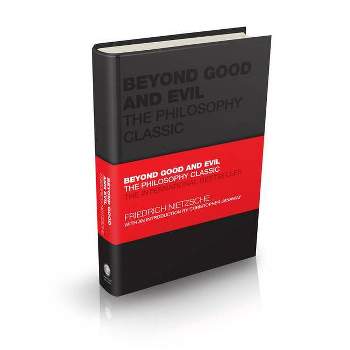Sponsored
Nietzsche's the Case of Wagner and Nietzsche Contra Wagner - (Edinburgh Critical Guides to Nietzsche) by Ryan Harvey & Aaron Ridley (Paperback)

About this item
Highlights
- Wagner was a lifelong obsession for Nietzsche.
- About the Author: Ryan Harvey is a Lecturer in Philosophy at The California State University Aaron Ridley is Professor of Philosophy at the University of Southampton.
- 280 Pages
- Music, Philosophy & Social Aspects
- Series Name: Edinburgh Critical Guides to Nietzsche
Description
About the Book
For the first time, Ryan Harvey and Aaron Ridley put Wagner centre-stage to show why he mattered so much to Nietzsche. Looking at both The Case of Wagner and Nietzsche Contra Wagner, they identify and define the trajectory of a number of overarching themes - modernity, decadence and Wagner as the sign of decline.Book Synopsis
Wagner was a lifelong obsession for Nietzsche. No other topic or figure more consistently and persistently appears in Nietzsche's books from beginning to end as do Wagner and his theories. For the first time, Ryan Harvey and Aaron Ridley put Wagner centre-stage in their book to show why he mattered so much to Nietzsche. Looking at both The Case of Wagner and Nietzsche Contra Wagner, they identify and define the trajectory of a number of overarching themes - modernity, decadence and Wagner as the sign of decline within Nietzsche's work as a whole - in order to demonstrate how they crystallise into Nietzsche's final and most substantial discussion of Wagner in The Case of Wagner. Assuming no prior knowledge of Nietzsche or the texts, the book also offers a section-by-section interpretation of The Case of Wagner addressing especially why Wagner is a 'case' for Nietzsche.From the Back Cover
Considers Nietzsche's lifelong obsession with Wagner and why it matters for understanding Nietzsche's philosophy as a whole Ryan Harvey and Aaron Ridley put Wagner centre-stage to show why he mattered so much to Nietzsche. Looking at both The Case of Wagner and Nietzsche Contra Wagner, they identify and define the trajectory of a number of overarching themes - modernity, decadence and Wagner as the sign of decline within Nietzsche's work as a whole - and then demonstrate how they crystallise into Nietzsche's final and most substantial discussion of Wagner in The Case of Wagner. Assuming no prior knowledge of Nietzsche or the texts, they offer a chapter-by-chapter interpretation of The Case of Wagner addressing especially why Wagner is a 'case' for Nietzsche. Ryan Harvey is a Lecturer in Philosophy at The California State University. Aaron Ridley is Professor of Philosophy at the University of Southampton.Review Quotes
A compelling examination of the philosophical stakes of Nietzsche's lifelong fascination with Wagner, from his early idea of a music-making Socrates, to his worries about the health of culture, through to his late concerns with vitalism and decadence. Harvey and Ridley give us Nietzsche's most bombastic book, contextualized and illuminated.-- "Andrew Mitchell, Emory University"
The authors rightly remark the unwarranted neglect of the significance of Wagner's influence on Nietzsche's philosophical thinking and the accompanying underestimation of The Case of Wagner. They remedy those deficiencies with a well-informed reading of that short but fascinating text and its treatment of the crucial interplay between philosophy and art.-- "Graham Parkes, University of Vienna"
About the Author
Ryan Harvey is a Lecturer in Philosophy at The California State University
Aaron Ridley is Professor of Philosophy at the University of Southampton. He is the author of The Deed is Everything: Nietzsche on Will and Action (OUP, 2018), Routledge Philosophy Guidebook to Nietzsche on Art (Routledge, 2007), The Philosophy of Music, Theme and Variations (EUP, 2004), Beginning Bioethics (Palgrave, 1998), Nietzche's Conscience: Sex Character Studies from the Genealogy (Cornell University Press, 1998), R. G. Collingwood: A Philosophy of Art (Orion, 1998), Music, Value and the Passions (Cornell University Press, 1995). He is co-editor of The Philosophy of Art: Readings Ancient and Modern, McGraw-Hill, 1995) and Arguing About Art: Contemporary Philosophical Debates (Routledge, 2007).











